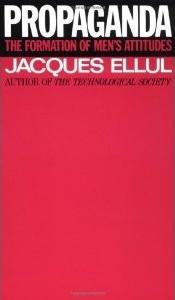Propaganda: The Formation of Men's Attitudes

Propaganda and the Formation of Men's Attitudes
|
|
| Author | Jacques Ellul |
|---|---|
| Translator | Konrad Kellen and Jean Lerner |
| Country | United States |
| Language | English |
| Publisher | Vintage Books |
| Pages | 320 |
| ISBN | |
Propaganda: The Formation of Men's Attitudes (1965/1973) (French: Propagandes; original French edition: 1962) is a book on the subject of propaganda by French philosopher, theologian, legal scholar, and sociologist Jacques Ellul. This book appears to be the first attempt to study propaganda from a sociological approach as well as a psychological one. It presents a sophisticated taxonomy for propaganda, including such paired opposites as political–sociological, vertical–horizontal, rational–irrational, and agitation–integration. The book contains Ellul's theories about the nature of propaganda to adapt the individual to a society, to a living standard, and to an activity aiming to make the individual serve and conform.
After being discharged as a professor from French universities by the Vichy regime Ellul became a leader in the French resistance during World War II. After the Liberation of France, he became a professor at the University of Bordeaux and wrote 58 books and numerous articles over his lifetime, the dominant theme of which has been the threat to human freedom created by modern technology.
As early as 1928, Edward Bernays recognized propaganda as a modern instrument to produce productive ends and "help bring order out of chaos." because of its secrecy it has been difficult to determine what constitutes propaganda and what the nature of propaganda is. For a time from 1920 to around 1933, propaganda was simplistically viewed as being able to modify sentiments and attitudes of an individuals without their being conscious. That limited perspective of propaganda as being able to influence the individual psychologically was prevalent.
The Institute for Propaganda Analysis from 1937, inspired by Harold Lasswell defined propaganda as "the expression of opinions or actions carried out deliberately by individuals or groups with a view to influencing the opinions or actions of other individuals or groups for predetermined ends and through psychological manipulations."
...
Wikipedia
